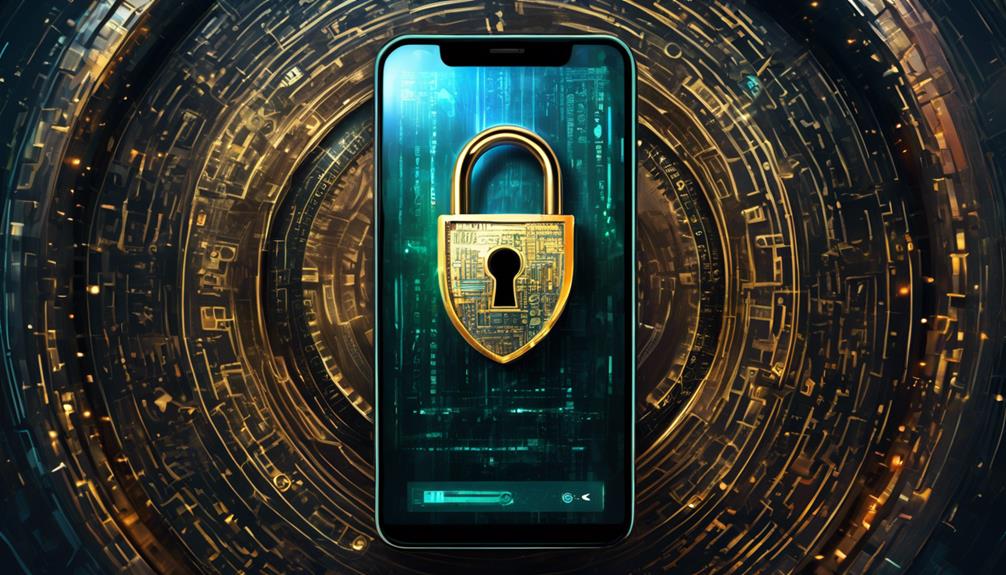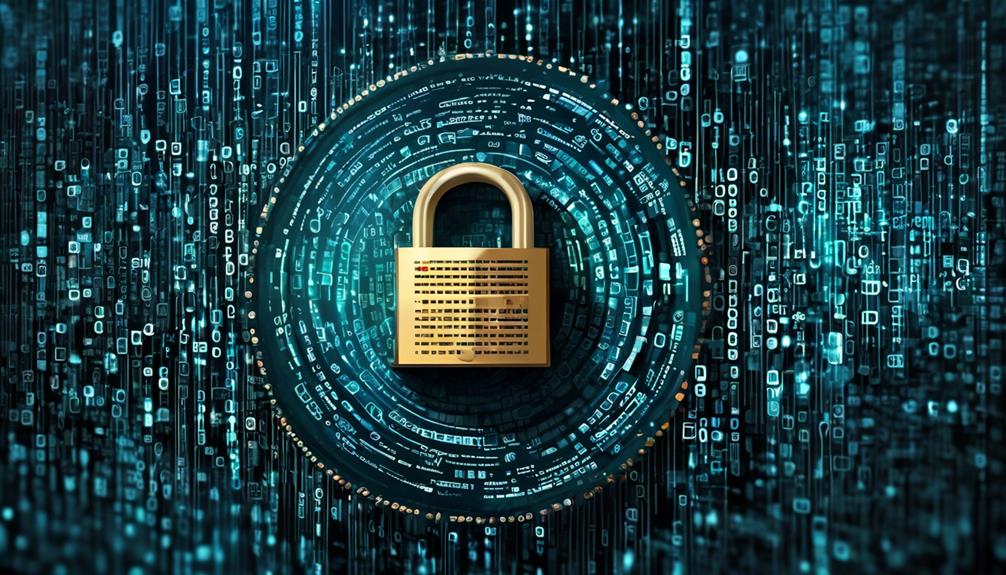In the digital shadows, potential breaches lurk behind every byte. Individuals carelessly share personal details on the internet. Without realizing it, they send messages that echo beyond their intended audience. These messages leave digital footprints, vulnerable to the tides of cyber threats.
It's a silent gamble, a trade of privacy for instant communication's convenience. As they compose their messages, they don't see the prying eyes. The question isn't just about shielding digital whispers. It's about the unseen consequences of ignoring security measures.
Understanding the invisible armor is crucial. It protects our private conversations from the internet's abyss. By understanding this, we arm ourselves against digital threats, often underestimated.
Understanding Secure Messaging

Secure messaging stands as a key pillar of digital privacy. It ensures that only the chosen recipient views your messages. Members of this community rightly cherish their part in a data-respectful digital world. Nevertheless, it's crucial to understand that secure messaging isn't just encrypting message texts.
It must also tackle potential metadata leakage. Such leaks can expose the sender, recipient, and timing, even if contents are safe. To combat these weaknesses, secure messaging apps use protocols that encrypt metadata and content. This dual-layer protection is vital for those valuing digital freedom.
It minimizes risks of unwanted surveillance and data misuse. When choosing messaging platforms, one must consider more than just end-to-end encryption. It's crucial to ensure protection covers every communication aspect, including attachments and group chats.
For those seeking a secure digital community, grasping secure messaging's subtleties is essential. Maintaining communication integrity is a collective duty. It begins with selecting messaging tools that match our privacy commitment.
Common Messaging Vulnerabilities
Messages sent without end-to-end encryption risk data interception. Consequently, attackers may misuse this information. Additionally, phishing often targets users via direct messages. This exploits trust, aiming to obtain sensitive details. Moreover, even with strong app encryption, device security flaws can threaten message integrity.
Unencrypted Data Risks
Understanding the vulnerabilities associated with unencrypted data is crucial, as it leaves personal communications susceptible to interception and unauthorized access. In the era of data monetization and surveillance capitalism, every message sent without encryption is a potential goldmine for entities craving valuable information. These unshielded pieces of data can be exploited for profit, with little regard for individual privacy.
Members of the digital community must be wary of these risks. They're not just numbers in a database; they're individuals whose personal stories and information are exposed. It's about protecting the intimacy of their conversations and maintaining control over their digital footprints. By opting for encrypted messaging services, they join a collective effort to safeguard their privacy against the ever-looming threats of unsecured communication channels.
Phishing via Direct Messages
While encrypted messaging services bolster privacy, users must remain vigilant against phishing attempts that exploit direct message platforms. Social engineering tactics are often at the heart of these schemes, preying on trust and the desire for connection within the community. Spoofing attacks, where malicious actors impersonate trusted contacts, are particularly insidious.
To paint a clearer picture:
- Suspicious Links: Unexpected requests to click on links that may lead to malicious sites.
- Urgency Tactics: Messages conveying a false sense of urgency to bypass rational thought.
- Information Requests: Asking for personal data or login credentials under false pretenses.
- Unusual Sender Behavior: Anomalies in the writing style or request patterns that suggest impersonation.
Staying informed and cautious helps maintain the sanctuary of your digital social circles.
Device Security Flaws
Despite strong encryption, device weaknesses can open doors for hackers to infiltrate messaging services. Individuals must understand hardware exploits' significance in breaching message security. Often, these shortcomings go unnoticed by users, yet they pose a severe threat to device safety. To counteract these issues, it is critical to update antivirus programs regularly. Furthermore, staying alert to new hazards is imperative. Antivirus tools are vital, as they identify and nullify hidden dangers. Proactively tackling hardware vulnerabilities is a key step. By doing so, users ensure their private messages stay protected. Consequently, this preserves the confidentiality of their interactions, and their sense of security in online communities is maintained.
The Consequences of Data Breaches
Data breaches can lead to dire consequences. For instance, individuals may face identity theft, financial loss, and privacy erosion. Personal information, when misused, often fuels malicious activities. Moreover, social engineering attacks become increasingly sophisticated with real user data, resulting in targeted phishing schemes. Consequently, identity theft emerges as a significant threat. Criminals use stolen identities to commit fraud, leaving victims to resolve the financial chaos.
Understanding the potential repercussions is crucial for community members. For example:
- Identity Theft: Breaches may provide personal details for impersonation and fraud.
- Financial Loss: Unauthorized account access could cause direct monetary theft.
- Compromised Security: Breached data might offer future cyberattack entry points.
- Loss of Trust: Companies face reputational damage, eroding user community trust.
In our digital era, personal information equates to currency and requires vigilant protection. As breaches threaten security, staying informed and cautious is crucial. Furthermore, it reinforces the need to protect privacy in every interaction.
Encryption: Your First Defense

As a fundamental layer of security, encryption scrambles your messages, making them accessible only to the intended recipient. This cryptographic technique ensures that even if an unauthorized party intercepts your communications, they won't decipher the contents. Understanding the different encryption types is crucial for individuals who value their privacy.
Symmetric encryption uses the same key for both encrypting and decrypting data. It's fast and efficient, ideal for large volumes of information. However, the key itself must be kept secret, shared only among authorized users. On the other hand, asymmetric encryption employs a pair of keys – a public key for encryption and a private key for decryption. This method facilitates secure key distribution but is computationally heavier.
Key management remains a pivotal aspect of encryption. Properly handling keys – generating, storing, distributing, rotating, and destroying them – is imperative to maintain the integrity of the encrypted data. If a key is compromised, so is the data it protects. Therefore, robust key management practices are the bedrock of a secure encryption strategy.
Those within the community seeking to safeguard their digital conversations must adopt encryption with diligent key management. It's not just a technical necessity; it's a commitment to collective security, ensuring everyone's right to communicate without risking their privacy.
Choosing the Right Messaging App
Selecting a suitable messaging app is vital for privacy. It is a key step in protecting digital conversations. In seeking security, choosing an app requires careful thought. It matters more than just following friends' choices. It's about joining a community that values private communication.
When evaluating features, important aspects to consider include:
- End-to-end encryption: This feature ensures that only the sender and receiver can read messages.
- Data retention policies: It's critical to examine how long an app keeps user data.
- Open-source software: Peer review through open-source can reveal security flaws.
- User anonymity: Check if personal information is needed for signup.
Making an informed decision requires detailed feature comparison. It's about how apps manage user data. The goal is to find a safe place for untainted conversations. The right app connects you with a privacy-conscious community. Choosing a platform is not just preference. It reflects a commitment towards a safer digital space. Your messages reflect your private thoughts. They warrant robust protection, not just a superficial layer.
Best Practices for Message Safety

Having chosen a messaging app with privacy-focused features, it's crucial to adopt message safety habits to further shield your digital communication. Users should create secure passwords that are complex, combining letters, numbers, and symbols to thwart unauthorized access. It's not just about selecting a strong password; it's about belonging to a community that values security and takes proactive steps to protect it.
In addition to secure passwords, enabling two-factor authentication (2FA) adds an extra layer of defense, significantly decreasing the likelihood of account breaches. This method requires a second form of verification, typically a code sent to a mobile device, which ensures that only the intended recipient can gain access to the messaging account.
Regularly updating these security features is also paramount. Users must not become complacent; hackers continuously evolve their tactics, so staying ahead with updated passwords and 2FA settings is vital. Members of the digital community owe it to themselves and to each other to maintain these standards, fostering an environment where privacy is not just an option, but a collective commitment.
Legal Implications of Privacy Laws
Understanding privacy laws' implications is essential for users who wish to ensure their digital communications remain protected from legal scrutiny and potential misuse. Privacy laws vary widely across jurisdictions, but they share a common goal: safeguarding personal information from unauthorized access and data breaches. However, these regulations also come with legal requirements that both individuals and organizations must adhere to, often influencing how messaging services operate.
To paint a picture for the audience:
- Data Retention Policies: Users must be aware of the duration for which their messages are stored by service providers, as mandated by law.
- Cross-border Data Transfer: Different countries have varying rules about how data can be transferred internationally.
- End-to-End Encryption: This technology can help ensure that messages remain private, but it may also be subject to legal debates about user privacy versus security concerns.
- Compliance Standards: Messaging platforms must comply with standards such as the General Data Protection Regulation (GDPR) or the California Consumer Privacy Act (CCPA), affecting how they manage user data.
In today's connected world, it's crucial for users to understand these complexities. Adhering to compliance standards and recognizing data retention policies are key steps towards maintaining one's privacy in the digital realm and feeling a sense of belonging in the online community, shielded by robust legal protections.
Frequently Asked Questions
How Does Metadata in Messaging Apps Affect My Privacy, and What Steps Can I Take to Protect It?
Metadata collection acts as a digital fingerprint that traces interactions. To safeguard privacy, individuals should tighten their privacy settings. This action limits data trails. Additionally, it promotes a secure sense of community. This community consists of cautious, tech-savvy communicators.
Are There Any Risks Associated With Using Open-Source Messaging Apps Compared to Proprietary Ones?
Open-source messaging apps undergo scrutiny, which ensures transparency. However, they may not always equal proprietary apps in trustworthiness. Therefore, she must consider risks. She should also take into account her community's preference for secure communication.
How Can I Safely Participate in Group Chats Without Compromising My Privacy or That of Other Participants?
Navigating group chats carefully, she adjusts her profile settings with accuracy. Consequently, her chat etiquette preserves everyone's privacy. This approach promotes belonging, yet she remains technically astute and wary.
Can the Use of Emojis, Stickers, or GIFs in Secure Messaging Apps Pose a Privacy Risk?
However, the use of emojis, stickers, and GIFs in secure messaging might appear innocuous. They can be analyzed for emotional content. Furthermore, these elements have encryption constraints. Consequently, this may reveal the feelings of users. Additionally, it could diminish their feeling of security in a confidential group.
What Measures Can I Take to Ensure Privacy When Voice Messages or Video Calls Are Involved, Not Just Text-Based Communication?
She's learning that voice encryption and incognito modes are essential, not just fanciful. Consequently, they're her key to confidential conversations. Therefore, she'll blend seamlessly with individuals prioritizing voice or video call privacy.
Conclusion
In the digital realm, your private messages are tempting bait for cyber predators. Don't just hand them over; defend yourself. Use encryption as your protective barrier. Wisely select messaging apps, as if strategizing in chess. Consistently practice safe messaging, treating it like essential digital hygiene. Remember, privacy laws can either safeguard or harm you. Stay alert and informed at all times. Most importantly, prioritize your security. After all, risking your privacy is never a wise bet.



